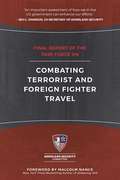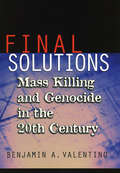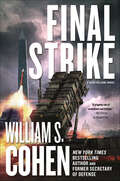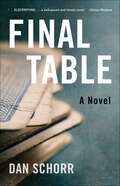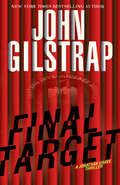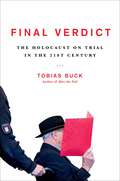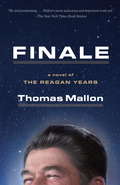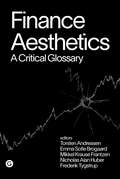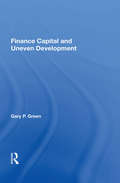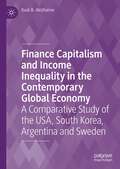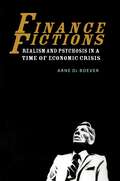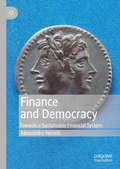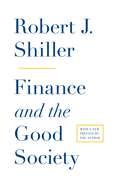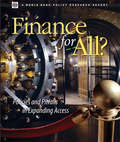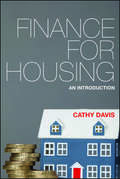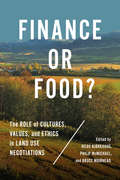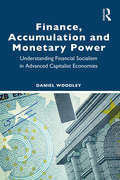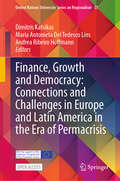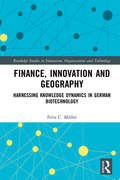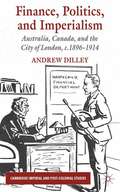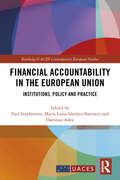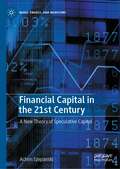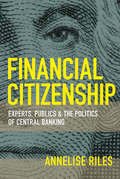- Table View
- List View
Final Report of the Task Force on Combating Terrorist and Foreign Fighter Travel
by Malcolm Nance Homeland Security Homeland Security CommitteeThe report addresses the urgent and growing threat of terrorist travel by Americans to Syria and Iraq. Despite the government's efforts to control this travel, hundreds of Americans have attempted to reach the conflict zones to join the jihadists. Using numerous briefings, interviews, site visits, and document analysis, the Task Force makes thirty-two key findings dealing with government strategy, identification of terrorists, and disruption of foreign fighter travel, including: Key Finding 1: The United States lacks a comprehensive strategy for combating terrorist and foreign fighter travel. Key Finding 14: State and local law enforcement personnel continue to express concern that they are not provided with the appropriate security clearances to assist with counterterrorism challenges. Key Finding 25: "Broken travel" and other evasive tactics are making it harder to track foreign fighters. Key Finding 29: Gaping security weaknesses overseas-especially in Europe-are putting the U.S. homeland in danger by making it easier for aspiring foreign fighters to migrate to terrorist hotspots and for jihadists to return to the West.Introductory remarks by security experts accompany the text and place these findings and recommendations in their proper context, explaining the critical need for effective strategy in combating terrorist travel from the United States.
Final Solutions: Mass Killing and Genocide in the 20th Century (Cornell Studies in Security Affairs)
by Benjamin A. ValentinoBenjamin A. Valentino finds that ethnic hatreds or discrimination, undemocratic systems of government, and dysfunctions in society play a much smaller role in mass killing and genocide than is commonly assumed. He shows that the impetus for mass killing usually originates from a relatively small group of powerful leaders and is often carried out without the active support of broader society. Mass killing, in his view, is a brutal political or military strategy designed to accomplish leaders' most important objectives, counter threats to their power, and solve their most difficult problems. Valentino does not limit his analysis to violence directed against ethnic groups, or to the attempt to destroy victim groups as such, but defines mass killing as the intentional killing of 50,000 or more noncombatants within five years. "Final Solutions focuses on three types of mass killing: communist mass killings like the ones carried out in the Soviet Union, China, and Cambodia; ethnic genocides as in Armenia, Nazi Germany, and Rwanda; and "counter-guerrilla" campaigns including the brutal civil war in Guatemala and the Soviet occupation of Afghanistan. Valentino closes the book by arguing that attempts to prevent mass killing should focus on disarming and removing from power the leaders and small groups responsible for instigating and organizing the killing.
Final Strike (Sean Falcone)
by William S. CohenIn his political, apocalyptic thriller, Final Strike, former Secretary of Defense and US Senator William Cohen dramatizes one of the most terrifying global security nightmares: an asteroid hurtling towards EarthSixty million years ago, the K-T Asteroid obliterated the dinosaurs, and now its apocalyptic twin is rocketing toward the US on a similar mission of extermination. Russian President Boris Lebed, the charismatic successor to Vladimir Putin, wants to turn that asteroid into a superweapon to use against the US and is holding Hamilton hostage in Moscow until Hamilton agrees to help. Former Senator and National Security Advisor Sean Falcone leads a dangerous off-the-books operation to bring Hamilton home and derail Lebed’s disastrous plan.But will Falcone succeed in time?The asteroid is hurtling toward earth. If it is not deflected, humanity will go the way of dinosaurs, and the entire planet will burn. Only one strategy has a chance of stopping humanity’s extinction—only one. There is no Plan B. The fate of the world hangs in the balance.At the Publisher's request, this title is being sold without Digital Rights Management Software (DRM) applied.
Final Table: A Novel
by Dan SchorrA political thriller about sexual misconduct in the #MeToo era, one victim’s battle to survive and overcome trauma, and the cable news machine that feeds off titillating scandal coverage and inflammatory confrontation, Final Table draws upon Dan Schorr’s firsthand experience as a New York sex crimes prosecutor and sexual misconduct investigator to tackle the worlds of political and media dysfunction. Former White House staffer Maggie Raster is struggling to build her own consulting firm and overcome a recent sexual assault by an ex-boss. Kyler Dawson, a broke former poker champion, desperately needs to gain entry into a controversial but potentially very lucrative international poker tournament. The host nation faces widespread condemnation for the recent murder of a prominent female US journalist, and a pending presidential executive order threatens to prohibit him and others from participating. Maggie’s chaotic first attempt to promote her new business as a television political analyst brings her to Kyler’s attention, and convinces him that her political smarts and connections can provide the help he needs. When he approaches her for assistance, she must decide whether to agree—in return for a portion of the potential $20 million prize. To succeed, she will have to confront significant adversity—personal and political, foreign and domestic—including mounting pressure to publicly address the misconduct of her former boss. Kyler also has his own obstacles and upsetting past to overcome, but if they each can outmaneuver their daunting challenges, he might win the tournament—and earn them both a fortune.
Final Target (A Jonathan Grave Thriller #9)
by John Gilstrap“Rocket-paced suspense.”—Jeffery Deaver“Gilstrap will leave you breathless.” —Harlan Coben “A great hero, a really exciting series.” —Joseph Finder Freelance operative Jonathan Grave faces his fiercest challenge yet in bestselling author John Gilstrap’s explosive new thriller . . .The mission: Drop into the Mexican jungle, infiltrate a drug cartel’s compound, and extract a kidnapped DEA agent. But when Jonathan Grave and his partner, Boxers, retrieve the hostage and return to the exfil point, all hell breaks loose. Ambushed, abandoned, and attacked on all sides, their only hope of survival lies inside a remote orphanage where innocent children have been targeted for death. Even if Grave can lead his precious cargo to safety across a hundred miles of treacherous jungle filled with enemies, he can’t shake the feeling that something bigger is at play. A vast conspiracy of international power players who take no prisoners—and leave no survivors . . . “When you pick up a Gilstrap novel, one thing is always true—you are going to be entertained at a high rate of speed.” —Suspense Magazine “If you like Vince Flynn and Brad Thor, you’ll love John Gilstrap.” —Gayle Lynds “Gilstrap pushes every thriller button.” —San Francisco Chronicle
Final Verdict: The Holocaust on Trial in the 21st Century
by Tobias BuckThe gripping narrative of one of the last Nazi criminal trials in Germany—that of Bruno Dey, a 93-year-old former concentration camp guard charged with aiding the murder of more than 5,000 people—and a larger exploration of Germany's reckoning with the Holocaust, from silence to memory to today's rising tide of fascism and antisemitism. Bruno Dey's trial formed part of an extraordinary series of Holocaust cases brought by German prosecutors in recent years in a belated attempt to deliver justice to the victims and reverse decades of judicial neglect. It also surfaced at a pivotal moment for Germany and its thinking about the Holocaust. The Nazi genocide continues to occupy a crucial space in German public life, but many of the country's long-held certainties and convictions around the Holocaust are starting to fray. This reflects in part the passage of time, and the fact that the last surviving witnesses—victims and perpetrators alike—are rapidly fading away. But it&’s also the result of profound changes in German politics and society. The far-right has made electoral gains and is openly challenging the country&’s historic commitment to Holocaust remembrance. At the same time, there is a small but vociferous group of intellectuals on the left who question Germany&’s memory culture from a different angle, asking what political lessons the country should draw from the Holocaust today. What does it mean for the country&’s new Muslim citizens from Syria and Afghanistan, many of whom arrived with their own traumas, to be expected to assume the nation&’s guilt? Final Verdict investigates questions that touch on German history, politics, and memory culture, and on the author&’s own family history. Buck revisits the silence that surrounds his own family&’s experiences and conduct during the Nazi period. In the face of rising anti-Semitism in Germany, the United States, and globally, Final Verdict examines the case for Holocaust justice in the twenty-first century—and the lessons that Germany's struggle with its Nazi past holds for the world today.
Final Warning: Averting Disaster in the New Age of Terrorism
by Robert Kupperman Jeff KamenIn a prescient study of terrorist acts, Kupperman and Kamen detail the similarities between different acts of terrorism and provide advice about countering such threats.
Finale
by Thomas MallonAdding to a fiction chronicle that has already spanned American history from the Lincoln assassination to the Watergate scandal, Thomas Mallon now brings to life the tumultuous administration of the most consequential and enigmatic president in modern times. Finale captures the crusading ideologies, blunders, and glamour of the still-hotly-debated Reagan years, taking readers to the political gridiron of Washington, the wealthiest enclaves of Southern California, and the volcanic landscape of Iceland, where the president engages in two almost apocalyptic days of negotiation with Mikhail Gorbachev. Along with Soviet dissidents, illegal-arms traders, and antinuclear activists, the novel's memorable characters include Margaret Thatcher, Jimmy Carter, Pamela Harriman, John W. Hinckley, Jr. (Reagan's would-be assassin), and even Bette Davis, with whom the president had long ago appeared onscreen. Several figures--including a humbled, crafty Richard Nixon; the young, brilliantly acerbic Christopher Hitchens; and an anxious, astrology-dependent Nancy Reagan (on the verge of a terrible realization)--become the eyes through which readers see the last convulsions of the Cold War, the beginning of the AIDS epidemic, and a political revolution. At the center of it all--but forever out of reach--is Ronald Reagan himself, whose genial remoteness confounds his subordinates, his children, and the citizens who elected him. Finale is the book that Thomas Mallon's work has been building toward for years. It is the most entertaining and panoramic novel about American politics since Advise and Consent, more than a half century ago.From the Hardcover edition.
Finale: A Novel of the Reagan Years
by Thomas MallonA New York Times Notable Book One of the Best Books of the Year: The Washington Post, San Francisco Chronicle, The Daily Beast, The Miami Herald, St. Louis Post-DispatchAdding to a fiction chronicle that has already spanned American history from the Lincoln assassination to the Watergate scandal, Thomas Mallon now brings to life the tumultuous administration of the most consequential and enigmatic president in modern times. Finale captures the crusading ideologies, blunders, and glamour of the still-hotly-debated Reagan years, taking readers to the political gridiron of Washington, the wealthiest enclaves of Southern California, and the volcanic landscape of Iceland, where the president engages in two almost apocalyptic days of negotiation with Mikhail Gorbachev. Along with Soviet dissidents, illegal-arms traders, and antinuclear activists, the novel's memorable characters include Margaret Thatcher, Jimmy Carter, Pamela Harriman, John W. Hinckley, Jr. (Reagan's would-be assassin), and even Bette Davis, with whom the president had long ago appeared onscreen. Several figures--including a humbled, crafty Richard Nixon; the young, brilliantly acerbic Christopher Hitchens; and an anxious, astrology-dependent Nancy Reagan (on the verge of a terrible realization)--become the eyes through which readers see the last convulsions of the Cold War, the beginning of the AIDS epidemic, and a political revolution. At the center of it all--but forever out of reach--is Ronald Reagan himself, whose genial remoteness confounds his subordinates, his children, and the citizens who elected him. Finale is the book that Thomas Mallon's work has been building toward for years. It is the most entertaining and panoramic novel about American politics since Advise and Consent, more than a half century ago.From the Hardcover edition.
Finance Aesthetics: A Critical Glossary (Goldsmiths Press / PERC Papers)
by Torsten Andreasen, Emma Sofie Brogaard, Mikkel Krause Frantzen, Nicholas Alan Huber, and Frederik TygstrupA unique, critical, and creative encyclopedia from scholars, artists, and writers on the world and words of finance capital.What does finance capital look like? How do the push and pull of debt and credit shape our feelings and relations? Across fifty-five unforgettable entries, Finance Aesthetics: A Critical Glossary offers an unorthodox appraisal of our bizarre, distorted contemporary condition.
Finance Capital And Uneven Development
by Gary P. GreenThis book examines the theoretical issues of finance capital by developing a comparative analysis of capital flows at industry, region, and nation-state levels. The analysis hopes to make an important methodological contribution to the literature on finance capital. .
Finance Capitalism and Income Inequality in the Contemporary Global Economy: A Comparative Study of the USA, South Korea, Argentina and Sweden
by Kuat B. AkizhanovThis book explores the causes of rising income inequality within industrialised, developing, and emerging economies. The development of finance capitalism over the last 40 years is charted to highlight how the neoliberal restructuring of national and global economies has driven income inequality. With case studies from the USA, South Korea, Argentina, and Sweden, a comparative analysis is presented to reveal how financialisation facilitates uneven capital accumulation and generates conditions that increase income inequality.This book aims to outline an analytical framework for a financialisation-induced income inequality nexus. It will be relevant to students and researchers interested in the political economy and financial economics.
Finance Fictions: Realism and Psychosis in a Time of Economic Crisis
by Arne De BoeverFinance Fictions takes the measure of what it means to live in a world ruled by high finance by examining the tension between psychosis and realism that plays out in the contemporary finance novel. When the things traded at the center of the economy cease to be things at all, but highly abstracted speculations, how do we come to see the real? What sorts of narrative can accurately approach the actual workings of a neoliberal economy marked by accelerating cycles of market crashes, economic and political crisis, and austerity?Revisiting such twentieth-century classics of the genre as Tom Wolfe's Bonfire of the Vanities and Bret Easton Ellis’s American Psycho, De Boever argues that the twenty-first century is witnessing the birth of a new kind of realistic novel that can make sense of complex financial instruments like collateralized debt obligations, credit default swaps, and digital algorithms operating at speeds faster than what human beings or computers can record. If in 1989 Wolfe could still urge novelists to work harder to “tame the billion-footed beast of reality,” today’s economic reality confronts us with a difference that is qualitative rather than quantitative: a new financial ontology requiring new modes of thinking and writing.Mobilizing the philosophical thought of Quentin Meillassoux in the close reading of finance novels by Robert Harris, Michel Houellebecq, Ben Lerner and less well-known works of conceptual writing such as Mathew Timmons’ Credit, Finance Fictions argues that realism is in for a speculative update if it wants to take on the contemporary economy—an “if” whose implications turn out to be deeply political. Part literary study and part philosophical inquiry, Finance Fictions seeks to contribute to a new mindset for creative and critical work on finance in the twenty-first century.
Finance and Democracy: Towards a Sustainable Financial System
by Alessandro VercelliThis book is an extension of the author's last book (Crisis and Sustainability: The Delusion of Free Markets, Palgrave Macmillan, 2017) and sheds light on the evolution of the financial system after the 2007/08 crisis and on changes and developments in the regulatory framework that have taken place concurrently over the last ten years. The book’s central theme addresses the neoliberal philosophy of financial regulation and, in particular, the role of self-regulating markets in the finance sector and how this has affected incentives and behaviour within the finance sector. The author contends that neoliberal maxims have led us to believe that market-based finance is superior to, and safer than, a more rules-based regulatory regime for the sector, and then explains that experience suggests otherwise. The huge expansion of ‘financialization’ in the developed economies over the last two decades has greatly magnified the risks emanating from the impact of highly leveraged, risk averse, under-regulated finance on other sectors of these economies. The author concludes that financial institutions need to be encouraged to operate within a more socially responsible matrix that facilitates and promotes long-term economic growth coupled with social stability.
Finance and the Good Society
by Robert J. ShillerNobel Prize-winning economist explains why we need to reclaim finance for the common goodThe reputation of the financial industry could hardly be worse than it is today in the painful aftermath of the 2008 financial crisis. New York Times best-selling economist Robert Shiller is no apologist for the sins of finance—he is probably the only person to have predicted both the stock market bubble of 2000 and the real estate bubble that led up to the subprime mortgage meltdown. But in this important and timely book, Shiller argues that, rather than condemning finance, we need to reclaim it for the common good. He makes a powerful case for recognizing that finance, far from being a parasite on society, is one of the most powerful tools we have for solving our common problems and increasing the general well-being. We need more financial innovation—not less—and finance should play a larger role in helping society achieve its goals.Challenging the public and its leaders to rethink finance and its role in society, Shiller argues that finance should be defined not merely as the manipulation of money or the management of risk but as the stewardship of society's assets. He explains how people in financial careers—from CEO, investment manager, and banker to insurer, lawyer, and regulator—can and do manage, protect, and increase these assets. He describes how finance has historically contributed to the good of society through inventions such as insurance, mortgages, savings accounts, and pensions, and argues that we need to envision new ways to rechannel financial creativity to benefit society as a whole.Ultimately, Shiller shows how society can once again harness the power of finance for the greater good.
Finance for All? Policies and Pitfalls in Expanding Access
by World BankAccess to financial services varies sharply around the world. In many developing countries less than half the population has an account with a financial institution, and in most of Africa less than one in five households do. Lack of access to finance is often the critical mechanism for generating persistent income inequality, as well as slower growth. 'Finance for All?: Policies and Pitfalls in Expanding Access' documents the extent of financial exclusion around the world; addresses the importance of access to financial services for growth, equity and poverty reduction; and discusses policy interventions and institutional reforms that can improve access for underserved groups. The report is a broad ranging review of the work already completed or in progress, drawing on research utilizing data at the country, firm and household level. Given that financial systems in many developing countries serve only a small part of the population, expanding access remains an important challenge across the world, leaving much for governments to do. However, not all government actions are equally effective and some policies can be counterproductive. The report sets out principles for effective government policy on broadening access, drawing on the available evidence and illustrating with examples.
Finance for housing: An Introduction
by Cathy DavisThe global financial crisis of 2007-08 was triggered by sub-prime mortgage mis-selling in the US and the global sale of these debts as new bonds. Austerity programmes are designed to reduce the borrowing that governments undertook to stabilise failing banking systems but the UK's Coalition government is using 'austerity' as a cover to dismantle the welfare state. Housing is at the forefront of these changes. Mortgages and rental costs are rising as 'the market' dictates them, while people with low incomes now receive substantially less financial help from the welfare state. In this much-needed text by an experienced author with a policy background, current housing finance issues (and their history) are linked with broader social policy and political themes. It covers the finance of building and refurbishment, managing and maintaining property for all the different tenures (owner occupation, council housing, housing association and private renting), and discusses whether current arrangements are sustainable. Written for housing, social policy and politics students and staff, it is also accessible to anyone concerned about housing in Britain today.
Finance or Food?: The Role of Cultures, Values, and Ethics in Land Use Negotiations
by Philip McMichael Hilde Bjørkhaug Bruce MuirheadExploring the ways in which culture, systems of value, and ethics impact agriculture, this volume addresses contemporary land questions and conditions for agricultural land management. Throughout, the editors and contributors consider a range of issues, including pressure on farmland, international and global trade relations, moral and ethical questions, and implications for governance. The focus of Finance or Food? is land use in Australia, Canada, and Norway, chosen for their commonalities as well as their differences. With reference to these specific national contexts, the contributors explore political, ecological, and ethical debates concerning food production, alternative energy, and sustainability. The volume argues that recognition of food, finance, energy, and climate crises is driving investments and reframing the strategies of development agencies. At the same time, food producers, small farmers, and pastoralists facing eviction from their land are making their presence felt in this debate, not just locally, but in national policy arenas and international fora as well. This volume investigates the many ways in which this process is occurring and draws out the cultural implications of new developments in global land use. An important intervention into a timely debate, Finance or Food? will be essential reading for both academics and policymakers.
Finance, Accumulation and Monetary Power: Understanding Financial Socialism in Advanced Capitalist Economies
by Daniel WoodleyThis accessible yet rigorous book examines the development of ‘financial socialism’ in advanced capitalist economies in the decade since the global financial crisis of 2007–2009. This new term refers to an attempt to resolve the accumulation crisis of capital through coordinated central bank activism, where state circuits of monetary capital assume a critical role in the reproduction of capitalist social relations. The book explains the dynamics of the crisis as it has developed and assesses the response of monetary elites to systemic financial risk in the global economy. Their failure to re-engineer growth following the technology boom of the late 1990s and the global financial crisis are driving fundamental changes in the form and function of capitalist money, which have yet to be theorized adequately. Finance, Accumulation and Monetary Power presents a revealing and radical critique of the failure of the International Political Economy to apprehend changes taking place within capitalism, employing a critical-theoretical analysis of contradictions in the capitalist reproduction scheme. The book will be of key interest to scholars, students and readers of international political economy, critical political economy, heterodox economics, globalization, international relations, international political sociology, business studies and finance.
Finance, Growth and Democracy: Democracy, Finance, and Growth (United Nations University Series on Regionalism #33)
by Dimitris Katsikas Andrea Ribeiro Hoffmann Maria Antonieta Del Tedesco LinsThe present volume uses a comparative regional approach to analyze how permacrisis—an extended period of instability and insecurity—has been experienced and dealt with in the European Union (EU) and Latin America. Written by academicians and policy experts from both regions, the volume has three main objectives. Firstly, it critically evaluates the response of regional organizations and governments in the EU and Latin America to the crises that have shaken these regions in recent years. Secondly, chapters contribute to a better understanding of the promised benefits and risks of digital currencies and fintech more generally to economic growth, financial stability and inclusion. Finally, the volume promotes an understanding of the challenges of permacrisis in both the EU and Latin America, as well as encouraging their cooperation at the multilateral and bi-regional levels. Providing an interdisciplinary perspective, this volume will be of interest to researchers and students of international relations, international political economy, international finance and economics, international law, global governance, and regionalism, as well as public officials of ministries of foreign affairs, finance and the economy, public officials of international and regional organizations. This is an open access book.
Finance, Innovation and Geography: Harnessing Knowledge Dynamics in German Biotechnology (Routledge Studies in Innovation, Organizations and Technology)
by Felix C. MüllerThe overarching aim of Finance, Innovation and Geography: Harnessing Knowledge Dynamics in German Biotechnology is to explore linkages between geographies of finance and relational geographies of innovation. This is achieved by questioning how investment activities affect the unfolding of innovations and in turn are affected by it. This book focuses on biotechnology innovation processes from the perspective of relational economic geography. It reconstructs the unfolding in time and space of eight innovations in German biotechnology. Each one is represented in a qualitative case study. The analysis focuses on the relational work of building, transforming, ending and replacing of collaborative relationships and organizational arrangements surrounding emergent innovations ・ including investment relations and relational work by investors. In this way, the contribution of investors to unfolding innovations is studied with sensitivity to context and situated interactions. The geography of these dynamics is conceptualized by drawing on the recent literature on relational proximity and distance as well as ideas of materiality and space. This book provides a unique perspective, and shows that innovation paths are strongly interwoven with local and temporary opportunities as well as crises, and that investment is embedded in these dynamics. This is essential reading for students and academics of both economics and innovation.
Finance, Politics, and Imperialism
by Andrew DilleyAndrew Dilley offers a major new study of financial dependence, examining the connections this dependence forged between the City and political life in Edwardian Australia and Canada, mediated by ideas of political economy. In doing so he reconstructs the occasionally imperialistic politic of finance which pervaded the British World at this time.
Financial Accountability in the European Union: Institutions, Policy and Practice (Routledge/UACES Contemporary European Studies #1)
by Paul Stephenson Hartmut Aden María-Luisa Sánchez-BarruecoThis book offers comprehensive coverage of various aspects of financial accountability around the EU budget – how it is spent via policies, how institutions engage in checking policy performance (what taxpayers’ money actually delivers), and therein, the issues of monitoring, controlling, auditing, scrutinising and communicating budgetary expenditure. Presenting conceptual and theoretical approaches including financial accountability, learning, multi-level governance, implementation and throughput legitimacy, it looks at EU institutions (European Parliament, European Court of Auditors, European Ombudsman, European Public Prosecutor’s Office) and national bodies (supreme audit institutions at the national level), examining their contact with the EU budget. It details the historical development of accountability mechanisms (the ‘statement of assurance’, financial corrections, and parliamentary oversight by the Budgetary Control Committee (CONT)), and examines policy areas such as those of agriculture, social policy and cohesion (including Structural Funds and the Common Agricultural Policy), exploring the challenges of financial accountability in practice. Given the recent introduction of non-budgetary financial instruments and tools only partly financed by the EU budget, it sheds light on new burgeoning areas such as the European Stability Mechanism (ESM) and the European Fund for Strategic Investment (EFSI) and the challenges they bring for ensuring the accountability of public money. This book will be of key interest to scholars and students of audit and evaluation, budgetary spending and financial control and, more broadly, public administration, public policy and EU institutions and politics.
Financial Capital in the 21st Century: A New Theory of Speculative Capital (Marx, Engels, and Marxisms)
by Achim SzepanskiThe book’s central theme is to develop a new theory of speculative capital related to other forms of capital, the world market, and the state. Unlike most Marxist and heterodox theories, the book distinguishes credit and fictitious capital from speculative capital to show its hegemony today in the capital markets. Speculative capital structures and also controls the so-called “real capital.” The method is Marxist while also incorporating material from contemporary Marxist and heterodox authors like John Milios, Robert Meister, Tony Norfeld, Li Puma, Harald Strauß, Michael Heinrich, Suhail Malik, Bichler/Nitzan and Ellie Ayache. Offering a comprehensive study of the logic and mode of existence of capital in the 21st century, the book will be of interest to academics and students of monetary and financial economics alongside political economy.
Financial Citizenship: Experts, Publics, and the Politics of Central Banking
by Annelise RilesGovernment bailouts; negative interest rates and markets that do not behave as economic models tell us they should; new populist and nationalist movements that target central banks and central bankers as a source of popular malaise; new regional organizations and geopolitical alignments laying claim to authority over the global economy; households, consumers, and workers facing increasingly intolerable levels of inequality: These dramatic conditions seem to cry out for new ways of understanding the purposes, roles, and challenges of central banks and financial governance more generally. Financial Citizenship reveals that the conflicts about who gets to decide how central banks do all these things, and about whether central banks are acting in everyone’s interest when they do them, are in large part the product of a culture clash between experts and the various global publics that have a stake in what central banks do.Experts—central bankers, regulators, market insiders, and their academic supporters—are a special community, a cultural group apart from many of the communities that make up the public at large. When the gulf between the culture of those who govern and the cultures of the governed becomes unmanageable, the result is a legitimacy crisis. This book is a call to action for all of us—experts and publics alike—to address this legitimacy crisis head on, for our economies and our democracies.
